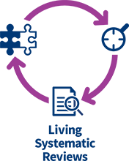
Which is harder: getting kids to eat more fruit and vegetables, or maintaining the Cochrane living systematic review of the rapidly growing evidence base on how to get kids to eat more fruit and vegetables? This year, a magnificent team led by Rebecca Hodder based at Australia’s University of Newcastle has proved that the latter can be done.
The official pilot period for four living systematic reviews (LSRs) ends in June, and the Project Transform LSR team has been collecting rich process evaluation data to provide insights into the workload and workflow implications of adopting a living approach to systematic reviews and inform decisions about the future of LSRs in Cochrane. The LSR team looks forward to sharing the full results of the LSR pilot evaluation with the Cochrane community in Edinburgh. Slides from a recent webinar offer a sneak preview of some of the practical experiences of two of the LSR pilot teams.
One of the LSRs, ‘Interventions for increasing fruit and vegetable consumption in children aged five years and under,’ received additional support from the Robert Wood Johnson Foundation as part of a broader Next Generation Evidence Systems project. This support has enabled the LSR team, working with Cochrane Heart and Project Transform’s machine learning and Cochrane Crowd citizen science platforms, to develop an automated workflow identifying RCTs from their monthly search results. With the help of this technology and a collaborative editorial and publishing approach, the team has published two updates since the start of the year, incorporating a total of 13 new studies since moving into living mode late 2017.
“There are definitely workload and project management challenges to adopting a living approach to systematic reviews” says Rebecca Hodder, lead of the LSR Interventions for increasing fruit and vegetable consumption in children aged five years and under. “Overall we found that maintaining the monthly searches and applying the RCT technology was much easier than anticipated. We’d advise any author team thinking about embarking on an LSR to seek out LSR expertise, adopt a strong project management approach and develop collaborative partnerships with your Information Specialist and editorial team.”
The experiences of the four LSR pilot teams and Cochrane editorial staff are an important contribution to the development of a methodologically robust and achievable model for Cochrane living systematic reviews. Rebecca’s team are leading the way and showing it can be done. Getting kids to eat more fruit and vegetables though? Now, that is still a major challenge!

|
Hodder RK, O'Brien KM, Stacey FG, Wyse RJ, Clinton-McHarg T, Tzelepis F, James EL, Bartlem KM, Nathan NK, Sutherland R, Robson E, Yoong SL, Wolfenden L. Interventions for increasing fruit and vegetable consumption in children aged five years and under. Cochrane Database of Systematic Reviews 2018, Issue 5. Art. No.: CD008552. DOI: 10.1002/14651858.CD008552.pub5 |
Support for Project Transform was provided by Cochrane and the National Health and Medical Research Council of Australia (APP1114605). The contents of the published material are solely the responsibility of the Administering Institution, a Participating Institution or individual authors and do not reflect the views of the NHMRC.
Support for the Next Generation Evidence Systems project was provided by the Robert Wood Johnson Foundation. The views expressed here do not necessarily reflect the views of the Foundation.

